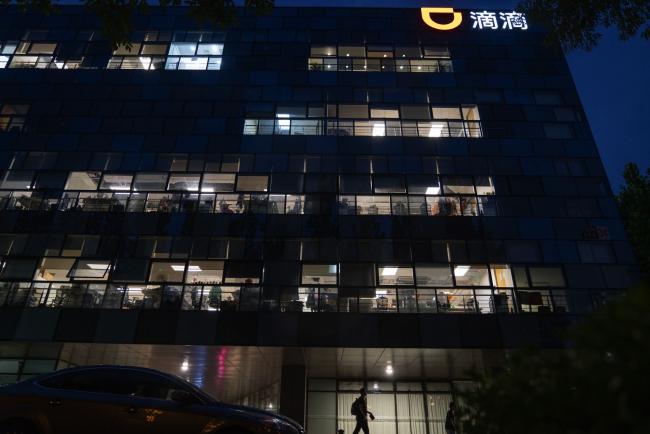(Bloomberg) -- Chinese regulators have asked Didi Global Inc.’s top executives to devise a plan to delist from U.S. bourses, people familiar with the matter said, an unprecedented request that’s likely to revive fears about Beijing’s intentions for its giant tech industry.
The country’s tech watchdog wants management to take the company off the New York Stock Exchange because of concerns about leakage of sensitive data, the people said, asking not to be identified discussing a sensitive matter. The Cyberspace Administration of China, the agency responsible for data security in the country, has directed Didi to work out precise details, subject to government approval, they said.
Proposals under consideration include a straight-up privatization or a share float in Hong Kong followed by a delisting from the U.S., the people added. If the privatization proceeds, the proposal will likely be at least the $14 IPO price since a lower offer so soon after the June initial public offering could prompt lawsuits or shareholder resistance, the people said. If there is a secondary listing in Hong Kong, the IPO price would probably be a discount to the share price in the U.S., $8.11 as of Wednesday’s close.
Shares in SoftBank Group Corp., Didi’s biggest minority shareholder, slid more than 5% in Tokyo.
Deliberations continue and it’s possible regulators will backtrack on their request, the people said. Either option would deal a severe blow to a ride-hailing giant that pulled off the largest U.S. IPO by a Chinese firm since Alibaba (NYSE:BABA) Group Holding Ltd.’s in 2014. Representatives for Didi and the CAC didn’t respond to requests for comment.
Didi sparked the ire of Beijing when it proceeded with its New York stock offering this summer, despite regulatory requests that it ensure the security of its data before the IPO. Chinese regulators quickly launched multiple investigations into the company and have considered a range of unprecedented penalties, Bloomberg News reported in July.
It’s possible that the delisting would be part of a package of punishments for Didi. Beijing’s municipal government has proposed an investment in the company that would give state-run firms effective control, Bloomberg News reported in September. Such an investment could help Didi finance the repurchase of its U.S.-traded shares.
Didi is currently controlled by the management team of co-founder Cheng Wei and President Jean Liu, which received aggregate voting power of 58% after the company’s U.S. initial public offering. SoftBank and Uber Technologies (NYSE:UBER) Inc. are Didi’s biggest minority shareholders.
Even if Didi shifts its listing to Hong Kong, it will have to address the data security concerns that have drawn regulatory scrutiny. The company may have to give up control of its data to a third-party -- again undercutting its price tag.
Regulators have weighed a delisting for Didi since the summer, after the world’s largest ride-hailing company infuriated officials by ploughing ahead with its U.S. IPO, Bloomberg News has reported. A withdrawal from U.S. bourses could stoke fears of an exodus of Chinese firms as Washington and Beijing quarrel about access to listed firms’ books. On Thursday, a senior Chinese regulatory official said such delistings would be a setback for relations with the U.S., while offering broad support for Hong Kong as an alternative venue.
Didi -- once feted for defeating Uber in China -- has now become a test case for a broader Chinese government effort to curb the power of internet titans. Xi Jinping’s administration, keen to promote his vision of sharing the wealth or “common prosperity,” has targeted an internet sector that’s accumulated vast wealth by operating on the periphery of the law, minted an unprecedented number of billionaires and enriched local and foreign investors in the process.
A state-directed privatization would be unprecedented for a private firm of Didi’s stature, affirming that the Chinese government remains bent on curtailing the power of the country’s internet firms and unlocking the data and wealth hoarded during a decade of heady expansion. It would send a chilling signal to American investors, long accustomed to investing freely in China’s largest corporations from Alibaba to Baidu Inc (NASDAQ:BIDU). and JD (NASDAQ:JD).com Inc.
Beijing’s moves against Didi have been particularly harsh, even after a crackdown that has penalized giants like Alibaba and Tencent Holdings (OTC:TCEHY) Ltd. The Cyberspace Administration of China saw Didi’s IPO decision as a challenge to the central government’s authority, which led to the CAC, the Ministry of Public Security, the Ministry of State Security and several other agencies initiating on-site inspections at Didi’s offices in July.
It’s since been ensnared by probes into data security and the way it treats its millions of drivers. Many of the options Beijing is weighing involve re-asserting state control over a company that’s traditionally operated in a legal gray zone, Bloomberg News has reported.
(Updates with SoftBank’s slide in the fourth paragraph)
©2021 Bloomberg L.P.
